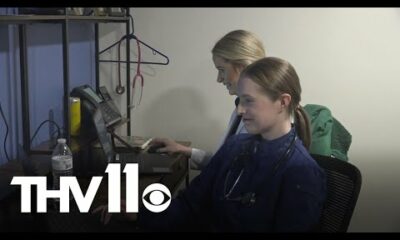Mississippi Today
Lawmakers dealing with finances, taxes may soon be dealing with a major headache

WARNING: The following contains a breadth of numbers so please proceed carefully, with a clear and sober mind. Still, it is possible the numbers could induce headaches.
The fiscal year that ended on June 30, 2022, concluded the short but unprecedented period of state revenue growth that was fueled by massive federal funding and inflationary factors that occurred in the aftermath of the COVID-19 pandemic.
The state collected $7.38 billion in general fund revenue during the fiscal year that ran from July 1, 2021, through June 30, 2022. There was growth of $643.6 million over the previous year. And for the year before, there was growth over the prior year of $924.5 million. For those counting, that is growth of $1.6 billion over two years.
To say the Legislature was flush with cash would be an understatement.
But then things began to slow down. In the fiscal year that concluded this past June of 2024, the state collected a much more modest $321.7 million more than was collected during the COVID-19 induced collections that occurred from 2021 to 2022. And importantly, during the just-completed fiscal year, the state collected a measly $18.4 million more than was collected the prior year.
During that cumulative time period — July 1, 2021, to June 30, 2024 — the state collected $7.13 billion in personal income taxes. Some might ask: What does that have to do with the price of tea in China?
The point is to highlight the significant share of the state’s general fund revenue that is derived from the personal income tax. And for those who might have been sleeping in a cave for the past few years, it needs to be pointed out Gov. Tate Reeves and many legislative leaders, including House Speaker Jason White, want to totally eliminate the income tax.
Even with all those unprecedented federal funds and the positive financial situation for the state caused by the pandemic, the Legislature would have had tremendous difficulty accomplishing some of the goals it did in recent years without revenue from the income tax.
For instance, without the income tax, it would have been difficult to have provided the largest teacher pay raise in history: $240 million in 2022. The Legislature also would have had difficulty pumping an additional $239 million in K-12 grade education in 2024 to fully fund the schools for the first time since 2007.
Reeves and some of those aforementioned legislative leaders like to point out the state is “flush with cash.” Indeed, the state does have unprecedented surplus funds thanks to the factors cited earlier — the federal funds and inflation that drove up personal income and the cost of retail items. Those increases resulted in more revenue for the state to tax.
And in recent years, legislative leaders have consistently chosen to appropriate fewer funds than they knew would be collected in tax revenue, resulting in those surpluses.
But the state being flush with cash will not last forever. It never does. It did not in the 1990s when the state experienced a similar financial windfall as the casino industry was birthed. And the rapid revenue growth that occurred from rebuilding south Mississippi in the mid-2000s after Hurricane Katrina’s destruction also ultimately slowed.
Indeed, that revenue growth is slowing now. Just look at the last fiscal year.
During the fiscal year that ended on June 30 of this year, the state collected $7.71 billion —only $18.4 million more than was collected the prior year.
And if not for $68.7 million in interest earnings (an 84% increase from the previous year), the state would have collected less revenue than the prior year for only the sixth time since 1970. Those higher interest rates have been good for the state’s bottom line.
Perhaps the most important number to remember is that about 30% of general fund revenue comes from the income tax.
The Legislative Budget Committee recently met and unveiled a budget surplus of $2.7 billion. But those funds — except for about $500 million — are not considered recurring money that typically fund ongoing expenses such as employee salaries.
The state is projected to collect about $2 billion in the personal income tax during the current fiscal year.
Without the income tax collections, there would be virtually no reserve funds — at a time the Legislature may have to take action to shore up a state and local employee pension plan that is facing a deficit estimated to be about $25 billion.
Perhaps that is the number that is most likely to give lawmakers headaches.
This article first appeared on Mississippi Today and is republished here under a Creative Commons license.![]()
Mississippi Today
On this day in 1917


Dec. 18, 1917

Actor, playwright and civil rights activist Ossie Davis was born in Cogdell, Georgia.
He saw racism from his youth with the KKK threatening his father because of the advanced job he held as a Black man. His father, Kince, eventually left the job, seeking greater independence.
Davis became a voracious reader and dreamed of being a writer. After graduating high school, he hitchhiked to Washington, D.C. and attended Howard University. Davis dropped out of Howard University to pursue acting in New York City.
Davis landed the lead role in the 1946 Broadway play “Jeb” about a disabled veteran battling racism in Louisiana. There he met his wife-to-be, Ruby Dee, whom he married two years later. The pair appeared in Lorraine Hansberry’s “A Raisin the Sun” and became active in the civil rights movement.
They became friends with Martin Luther King Jr., helping organize and emcee the 1963 March on Washington. They also became friends and supporters of Malcolm X. Davis gave the eulogy at Malcolm X’s funeral — a eulogy he reprised with his rich baritone in Spike Lee’s “Malcolm X.”
“Here—at this final hour, in this quiet place—Harlem has come to bid farewell to one of its brightest hopes—extinguished now, and gone from us forever,” he said. “He was our manhood, our living, Black manhood! This was his meaning to his people. And, in honoring him, we honor the best in ourselves. … Consigning these mortal remains to earth, the common mother of all, secure in the knowledge that what we place in the ground is no more now a man—but a seed—which, after the winter of our discontent, will come forth again to meet us. And we will know him then for what he was and is—a prince—our own Black shining prince!—who didn’t hesitate to die, because he loved us so.”
Davis and Dee appeared in other Lee movies, including “Do the Right Thing,” and often took on racial injustices and civil rights in their work. In 2004, they were honored at the Kennedy Center for taking “their art to colleges, community centers, cafeterias, hospitals, union halls and prisons. Wherever they stood was their stage.”
Ten months later, Davis died, and Broadway turned down the lights on marquees to honor him.
This article first appeared on Mississippi Today and is republished here under a Creative Commons license.![]()
Mississippi Today
Hope and recovery: Personal journeys amid Mississippi’s opioid crisis

As Mississippi grapples with the opioid epidemic, individuals and local organizations are leading efforts to fight addiction using personal experiences and acts of compassion to guide others toward recovery.
Opioid-related overdose deaths in Mississippi in 2022 accounted for 78.4% of all overdose fatalities in the state, claiming 281 lives, according to the Mississippi State Department of Health.
Mississippi pharmacies dispensed over 410,000 opioid doses daily on average, totaling 149 million doses in a year — equivalent to about 50 doses per resident, according to the Mississippi State Department of Health.
While state officials work to bolster prevention and treatment programs, local organizations and those in recovery play a critical role in addressing the epidemic.

For Jody Couch, founder of Inside Out Outreach, the battle against addiction begins with compassion and community support. Her Gulf Coast-based organization focuses on providing food, clothing, toiletries, spiritual support and other essential resources to individuals experiencing homelessness and battling addiction, addressing immediate needs while fostering a sense of community.
Couch’s Christian faith fuels her work, she said.

“Many people I meet feel invisible,” Couch said. “We remind them they’re not. This is more than just providing food or clothes — it’s about showing them a way forward. I believe that with faith and encouragement, people can find the strength to overcome their struggles.”
That’s what she tried to show 47-year-old Jennifer Callais of Louisiana on a Wednesday morning in August in Gulfport. Callais stood before her, tears streaming down her face.



“I just want to get better and change my life,” Callais said as Couch handed her a bag of donated clothes and food for her and her boyfriend. For years, Callais had struggled with opioid addiction and is one of many individuals Couch regularly supports.
Through Inside Out Outreach, Couch spends her days delivering goods to homeless encampments, offering prayer, and helping people envision a path to recovery. Though she has no personal history of addiction, Couch’s work is rooted in empathy and faith. Encounters like Callais’ reaffirm her belief that small acts of compassion can spark hope and transform lives.
Finding recovery through faith
For 43-year-old Casey Wortman of Saltillo, addiction is personal, and she aims to use her lived experiences to help others.
As a teenager, Wortman turned to opioids to escape feelings of loneliness and despair.


“Drugs became my escape from loneliness and those terrible voices in my head,” Wortman said.
Wortman’s challenges began early. Her parents divorced when she was three, creating an unstable home environment. After her father died when she was 11, she entered into a downward spiral of drug and alcohol use, compounded by trauma and family instability.
Wortman’s road to recovery began with a transformative spiritual experience. In 2017, she turned to faith-based treatment, enrolling in Transformation Home for Women in Mississippi. This decision marked a pivotal moment in her life, as she found strength and purpose through her faith, she said.

“I just scream and shout and worship because Jesus set me free,” she said. Through her recovery, she reconnected with her children, rebuilt her family and embraced her role in helping others.
“There were so many times I thought I’d never make it,” Wortman said. “But I did. And if I can, so can others.”

Today, Wortman is married, a mother, and works at Anchor Church in Tupelo, helping others discover the strength that faith and community can provide. Her life now stands in stark contrast to the struggles she faced during her addiction.
“I have both of my children back, and I’ve been married for five years to the most hardworking, loving, selfless, caring man I know,” Wortman said. “Recovery gave me more than sobriety — it gave me a life I never dreamed was possible.”



‘A turning point’
Patrick Davis of Tupelo said he found recovery through resilience, purpose and the support of his community. The 22-year-old’s addiction began as a way to escape fear and anxiety, but the toll it took on his relationships and self-worth eventually pushed him to make a change.
“I got tired of being embarrassed, detoxing constantly, just trying to survive,” Davis said. “I wanted to look myself in the mirror again and be OK.”

Davis struggled with how his addiction affected his family. While they wanted him around, he often kept his distance, ashamed of the burden he placed on them.
“My family loved having me around, but when I was there, I wasn’t really there,” Davis said. “It was hard for me to show up for anything. I was always late, or I just wouldn’t come. I was stressful to be around, and I gave it all away. Today, it’s different. They can trust me now, and it feels good to be wanted again.”
At 19, Davis entered recovery, tired of the cycle of addiction and seeking something more meaningful. The decision to pursue sobriety was rooted in wanting to reclaim his life.

“It wasn’t easy, but I had to relearn how to live,” Davis said.
Richard Morris, who has been Davis’ best friend since fifth grade, saw the toll addiction took on him.
“The Patrick that was around back then was barely a person,” Morris said. “He couldn’t exist without the stuff. To imagine back then that he would have even been in my wedding — it’s impossible to imagine. When I first saw him after rehab, it was like the first time I’d seen him alive in five years.”



Now, Davis is studying social work and channels his experiences into his job as a community outreach representative at Heale Counseling in Tupelo, finding fulfillment in helping others.
“I love my job. I love its culture,” Davis said. “We lead with honesty and integrity, and you don’t find many companies like that. I’m proud of all the work we’ve done and the staff’s reputation.”
Morris, who has been sober for nearly three years, said he’s proud of his friend’s transformation.
“Patrick was rough, and it started really young,” Morris said. “But to see him get better, it’s incredible. He’s like a brother to me, and I couldn’t be prouder.”
-PHOTO GALLERY-
This article first appeared on Mississippi Today and is republished here under a Creative Commons license.![]()
Mississippi Today
On this day in 1938


Dec. 17, 1938

L. C. Dorsey was born to a sharecropping family in Tribbett, Mississippi. She became friends with Fannie Lou Hamer, who inspired Dorsey to get involved in the civil rights movement and to join the Mississippi Freedom Democratic Party, for which Dorsey began organizing boycotts and demonstrations.
She began working for Head Start and then Operation Help. After getting her doctorate from Howard University, she returned to Mississippi and resumed her work with Head Start, this time as the director of social services in Greenville. She also began working on prison reform, serving as associate director of the Southern Coalition on Jails and Prisons from 1974 to 1983.
Dorsey wrote a book, “Cold Steel,” describing life in Mississippi’s Parchman prison, and served on President Jimmy Carter’s National Council for Economic Opportunity.
In 1988, she became executive director of the Delta Health Center in Mound Bayou and later worked as a clinical associate professor for the University of Mississippi Medical Center.
She died in 2013. An annual award honors her work, and so does the Mississippi Civil Rights Museum.
This article first appeared on Mississippi Today and is republished here under a Creative Commons license.![]()
-

 News from the South - Alabama News Feed7 days ago
News from the South - Alabama News Feed7 days ago‘We have to help’ Bon Secour church continues tradition of free food for their community
-

 News from the South - Tennessee News Feed6 days ago
News from the South - Tennessee News Feed6 days agoMistrial declared in Timothy Herrington's capital murder trial for death of Jimmie “Jay” Lee
-

 News from the South - Arkansas News Feed2 days ago
News from the South - Arkansas News Feed2 days agoFaith-inspired ministry opens health clinic in Little Rock
-

 News from the South - Florida News Feed1 day ago
News from the South - Florida News Feed1 day ago‘Dirty Dancing,’ ‘Beverly Hills Cop,’ ‘Up in Smoke’ among movies entering the National Film Registry
-

 News from the South - Missouri News Feed6 days ago
News from the South - Missouri News Feed6 days agoThree years ago a tornado brought nothing but disaster to the City of Mayfield – KBSI Fox 23 Cape Girardeau News
-

 News from the South - North Carolina News Feed7 days ago
News from the South - North Carolina News Feed7 days agoNFL issues security alert to players as South American crime syndicate targets homes | National
-

 Local News7 days ago
Local News7 days agoA fugitive gains fame in New Orleans eluding dart guns and nets
-

 News from the South - South Carolina News Feed7 days ago
News from the South - South Carolina News Feed7 days agoCold, windy day













































